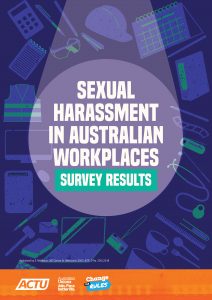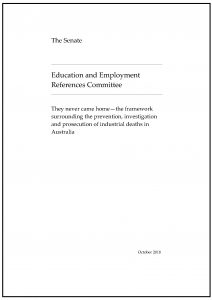Already a member? Log in here
 This Sunday SafetyAtWorkBlog will be reporting from the 2018 National Conference of the Australian Labor Party (ALP). It promises to be extra lively as the country is only a few months away from a General Election and the ALP is tipped by most to win, or rather, the Liberal/National Coalition to lose. The intention is to watch for discussion of issues that relate to, or affect, the management of worker health and safety. There will be some, if one accepts that the most effective and sustainable occupational health and safety (OHS) solutions come from both a introduce multidisciplinary approach and that one that looks “at the source” of hazards.
This Sunday SafetyAtWorkBlog will be reporting from the 2018 National Conference of the Australian Labor Party (ALP). It promises to be extra lively as the country is only a few months away from a General Election and the ALP is tipped by most to win, or rather, the Liberal/National Coalition to lose. The intention is to watch for discussion of issues that relate to, or affect, the management of worker health and safety. There will be some, if one accepts that the most effective and sustainable occupational health and safety (OHS) solutions come from both a introduce multidisciplinary approach and that one that looks “at the source” of hazards.
The current draft National platform has a specific chapter on Safety At Work but the document is riddled with safety commitments. Curiously there is no specific mention of Industrial Manslaughter, although the ALP will
“ensure there are strong deterrents for employers who are responsible for workplace deaths”.
 The trade union movement has often been instrumental in affecting and sometimes creating government policy on occupational health and safety (OHS). The latest generation of hazards – psychosocial – can be traced back to a survey late last century of workplace stress conducted by the Australian Council of Trade Unions (ACTU). This week the ACTU released its survey into sexual harassment at work.
The trade union movement has often been instrumental in affecting and sometimes creating government policy on occupational health and safety (OHS). The latest generation of hazards – psychosocial – can be traced back to a survey late last century of workplace stress conducted by the Australian Council of Trade Unions (ACTU). This week the ACTU released its survey into sexual harassment at work.
The current survey should not be seen as representative of any social group other than trade union members even though the survey was completed by 10,000 of them. Also, this survey is far less likely to be as newsworthy as last century’s surveys as the agenda on workplace sexual harassment has already been established by reports from groups like Universities Australia and, especially, the current work by the Sexual Discrimination Commissioner and the Australian Human Rights Commission. It is also likely to be covered, probably as a secondary issue, in the various mental health inquiries scheduled for 2019.
The ACTU survey provides additional information to our understanding of sexual harassment at work but certainly not the whole picture.
 The Coronial Finding in to the death of Jorge Castillo-Riffo is an important occupational health and safety (OHS) document. It discusses, amongst other matters,
The Coronial Finding in to the death of Jorge Castillo-Riffo is an important occupational health and safety (OHS) document. It discusses, amongst other matters,
More issues than these are raised in the Finding and I urge all OHS people to read the document and reflect on the OHS management in their workplaces.
Most non-transport industries do not look for the lack of sleep or fatigue as a factor in their investigations. Unless a formal investigation is undertaken, fatigue is rarely mentioned and, if it is, it is categorised as a “contributory factor”, which often means it is given such a low priority that nothing will be done about it. This is partly a legacy of silo thinking that sleep is a non-work personal activity, which it is, but is still one that can affect work and all the relationships and decisions made at work. But it is also partly due to the enormous disruption that could result if the lack of sleep and fatigue were taken seriously and effective control measures were introduced.

The most effective control for fatigue may be human-friendly shifts and “reasonable” working hours but that might not fit the shift rosters which are required to satisfy clients. We know that night shift has higher health and physical risks than day shift so logically, get rid of night shift ….

Will the recommendations of the Senate Committee’s inquiry into industrial deaths benefit relatives of deceased workers? Yes, mostly.
It seemed like relatives gained greater access to this Senate Committee than in other inquiries. Some public hearings were held with only relatives presenting. This is a major change. The transcripts of the 2012
 One of the noticeable things about the Australian Senate’s report into industrial deaths is the workload it expects Safe Work Australia (SWA) to do in the implementation of the 34 official recommendations. Whether Safe Work Australia has the capacity and skills to undertake these tasks is not addressed.
One of the noticeable things about the Australian Senate’s report into industrial deaths is the workload it expects Safe Work Australia (SWA) to do in the implementation of the 34 official recommendations. Whether Safe Work Australia has the capacity and skills to undertake these tasks is not addressed.
The Senate report expects Safe Work Australia to develop various data-sets and public lists and to work with State and Territory occupational health and safety (OHS) regulators. But the lessons from OHS harmonisation and Safe Work Australia’s Model Laws reinforced that workplace health and safety is controlled by the States and Territories and that, although an Inter-Governmental Agreement was signed, party and local politics knobbled the harmonisation program so that several years on, Australian OHS laws are only slightly more harmonised than they were before the program began.
In the early 1990s, a program for National Uniformity of OHS laws was cancelled for political reasons. Prior to harmonisation there were strong calls for a national OHS regulator but this could not be undertaken without Constitutional reform. That lack of a single National OHS regulator is all over this Senate inquiry report.